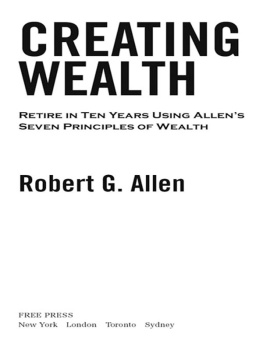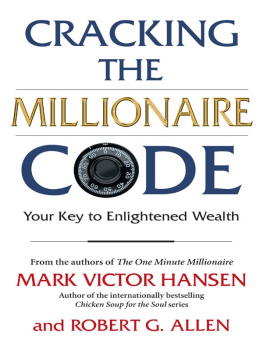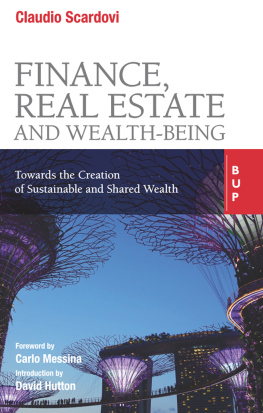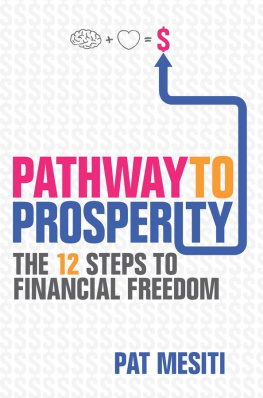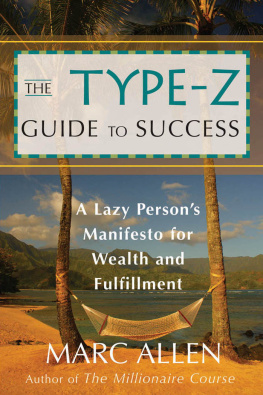A Division of Simon & Schuster, Inc.
Illustrations by David E. Canaan
All rights reserved, including the right of reproduction in whole or in part in any form.
FREEPRESSand colophon are trademarks of Simon & Schuster, Inc.
Allen, Robert G.
Robert G. Allen.
p. cm.
Includes index.
1. Finance, Personal.
I. Title.
This publication is designed to provide accurate and authoritative information, not legal advice. Events and laws may change after publication. The author and publisher specifically disclaim any liability, loss, or risk, personal or otherwise, which is incurred as a consequence, directly or indirectly, of the use and application of any of the contents of the work. Before acting on any suggestion presented in this book, legal or other professional assistance may be advisable.
The verse on page 243 comes from The Road Not Taken from The Poetry of Robert Frost , edited by Edward Connery Lathem. Copyright 1916. 1969 by Henry Holt and Company Inc.; copyright 1944 by Robert Frost. Reprinted by permission of Henry Holt and Company Inc., publishers.
The chart of key factors in gold and silver prices is used by courtesy of Investment Rarities, Inc.
Chapter 1
We Were Programmed to Fail
from the Moment We Were Born
Practical men, who believe themselves to be quite exempt from any intellectual influences, are usually the slaves of some defunct economist.
JOHNMAYNARDKEYNES
Why is it that money seems to flow to some people like a magnetand seems to be repelled from others? This question has always intrigued me. And I was determined to discover the answer.
I began to examine my own experiences in creating personal wealth. I talked with dozens of people: poor, well-off, and wealthy. Each person taught me something. I began to notice common threads and patterns. What I discovered was astonishing!
Let me share with you a whole new way of thinking about money and a proven method of acquiring wealth. In the process, I will put to rest (hopefully forever!) an incredible number of myths and misconceptions about what it takes to makeand keepgreat wealth.
As I will show you, most of what we know about money is based upon false assumptions. As the nineteenth-century humorist Josh Billings so aptly put it: The trouble with people is not that they dont know, but that they know so much that just aint so.
How do people get to know so much misinformation about wealth? They are programmed. Of course, there is really nothing sinister about it. There is no conspiracy afoot to brainwash unsuspecting people into thinking poorly. Actually, much of it is nothing more than the common sense of past generations taken to extremes. These widely held sacred-cow notions about saving, spending, borrowing, and investing are taught by well-intentioned teachers in our finest universities, in our newspapers, on television, from our pulpits, and in our homes. We take them for granted just as people used to assume the world was flat or that the sun revolved around the earth.
As a consequence, only a small percentage of the millions who try ever join the ranks of the wealthy. How can they? They are building on a shaky foundation.
Ill never forget a radio interview I did in Pittsburgh. The host and I spent some time talking about the road to wealth. The hosts assistant, a young woman, listened intently. After the interview she questioned me. Mr. Allen, all of what you say sounds interesting, even feasible. But it goes against everything my parents have always taught me!
I asked, How are your parents doing financially? She replied, Terribly. They are really strapped for money. Then she laughed at what she had just said. She understood.
Granted, it isnt easy to let go of our programming. There are lessons we feel we have learned from the Great Depression of the 1930s, the Great Recession of the 1970s, the Great Stagnation of the 1980s, or the great stock-market booms and busts of the last twenty years. But we dont have to be like the monkeys in a story I heard recently. It seems that in Africa, the natives use an ingenious method for catching monkeys. They hollow out a coconut shell by cutting a small hole at one end. The hole is small enough to barely allow a monkeys hand. Inside the hollowed shell they place a few peanuts. They connect the coconut shell to a thin, strong cord and wait in hiding for the monkeys. When a monkey discovers the nuts inside the shell, he reaches in and grasps them in his fist. But the hole is too small to allow the tightly clenched fist to escape. At this precise moment, the native pulls on the cord, and the monkey, who wont let go of those peanuts to save his life, is caught.
Too often, we hold tightly to our own peanut ideas for fear that we may lose themwhen all the while it is these very ideas that hold us captive and prevent us from achieving financial freedom.
Well, what are these false assumptions? And how can we learn to let go of them? Lets examine the nine most prevalent faulty assumptions about wealth. As you study them, notice how each one contains a grain of truth.
False Assumption 1: Having a Job Is Good and Leads Ultimately to Wealth
I asked a young telephone receptionist in Columbus, Ohio, to tell me her idea of the most important factor in wealth acquisition. She replied, A good job, a great job, a fantastic job. I was surprised by how often this same answer was given by those whose income is average or below. Millionaires rarely respond this way.
It is commonly held in our society that finding a good job, working hard, and moving up the ladder to more responsibility will eventually take us to golden retirement years of wealth and happiness. The fact of the matter is that a job merely supports the habits we have (like eating), but it rarely leads to wealth. As one shrewd observer put it, Wealth is when small efforts produce large results. Poverty is when large efforts produce small results.
No matter how much you love your job, expecting it to make you wealthy is like looking for gold in a salt mine. If your large efforts are only producing small results, you had better check the road map. You may be on the road to poverty.
The answer is not to work harder, but to work smarter. A job should be looked upon as a temporary inconvenience. It is a method for generating cash flow for living expenses while you are setting up an automatic pilot (more on this in chapter 5). Thus, having a job is necessary for a while, but dont forget the other part of the equation. Your ultimate goal is to acquire ownership of a generous source of income that flows to you regardless of your job. Accomplishing that goal is what this book is about.
False Assumption 2: Saving Your Money Is
a Good Investment
How many millionaires do you know who have become wealthy by investing in savings accounts? I rest my case.
But dont get me wrong. Saving money is good. In fact, it is important to the wealth-building process. Its not the money saved that is important. It is the discipline required to save it. But you cant expect your savings to carry you to wealth. And this is the fact that is so widely misunderstood. Assuming only minimal inflation and taxes, it doesnt take a PhD in finance to realize that any dollar that earns less than about 10 percent per year is a losing venture. At best, it is the slow liquidation of wealth.

